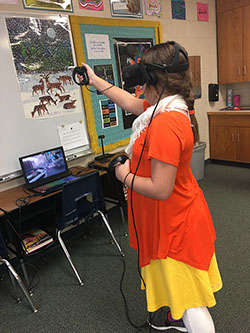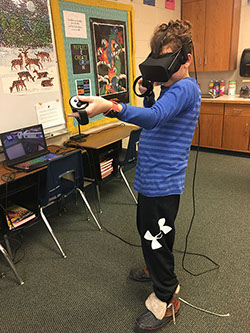growing interest in Virtual Reality (VR) applications as an immersive instructional tool, has led Victory VR to create a virtual reality curriculum that is based on national next generation science standards. Victory VR, is a Davenport-based Virtual Reality science curriculum company acquired by Kendall Hunt, and is seen as the world’s leader for virtual reality science curriculum.
Consistent with its long-standing relationship with Kendall Hunt as a developer of faith-based science curriculum, the NAD Office of Education is conducting a pilot of Kendall Hunt’s Victory VR science application. Fundamentally, this tool has the potential of arresting students’ attention in the awe of science and the genius of our Creator. 
Some NAD elementary science classrooms are currently piloting Victory VR. Early responses confirm that Victory VR offers students with and without gaming acumen, a three-dimensional surround experience in visiting places they can only dream of being. Whether landing on a planet or traveling down the oesophagus into the digestive system, Victory VR gives a first-hand, up close encounter into the unseen, while making good on its premise of immersive transmittal of content.
After a few days of piloting Victory VR, Jean Anderson from Battle Creek Academy wrote, “my students really enjoyed the experience. They were amazed how real it made things in space seem.”
Victory VR allowed Aaron Koleda’s classes to explore other science units outside the ByDesign science curriculum, as well as other curricula such as art. Reflecting on the high engagement level among his students at the Village School in Berrien Springs, Aaron noted, “All the student really enjoyed it a lot. They can experience historical events, explore the discoveries of the present and beyond.” Aaron concluded that, “The experiences can be very immersive when students get to use their hands.”
Dr. Patricia Williams, principal of Downers Grove Elementary School in Illinois, remarked, “This system is wonderful. We may have to extend our school days so everyone can have more VR time.” For Sherina Phillips a teacher in Northeastern Conference and TDEC representative for Atlantic Union, Victory VR was very much like something they [students] used at home to play games. It wasn’t long before they realized that this was much more. “Students were amazed to be able to float through space and see the planets,” Sherina recalled. “WOW! I can see the sun!” was the reaction of a Pre-kindergarten student—one echoed by Northeastern Conference’ students who used the device.
Setting up and use of the unit have not been without challenges. Those included logging on, password changes, excess time required for downloading the content and available curriculum for the hand-held devices. All pilot schools were challenged with having one available unit for an entire class. For future use, Jean thought it would help if the VR unit could be more accessible for an entire group of students rather than just one individual at a time, or if she could set up her classroom with stations, allowing the VR unit to be one of the rotating stations. Archie Harris, TDEC representative for North Pacific Union and teacher, along with other pilot teachers, acknowledge their appreciation in piloting Victory VR. For them, the cost of the units is a concern, particularly for small schools who will find the annual licensing fee and the cost of a computer with the required specifications to run the applications, above their means.
Despite these concerns, participating TDEC reps and pilot teachers agree that students were engaged and schools were generally excited about the opportunity to pilot and review Victory VR science content.
A

associate director of education

copyright 2018 North American Division of Adventist Education. all rights reserved.
